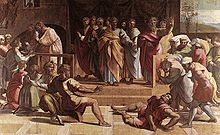- Ananias and Sapphira
-
Ananias (pronounced /ˌænəˈnaɪ.əs/) and his wife Sapphira (/sæˈfaɪrə/) were, according to the Acts of the Apostles, members of the Early Christian church in Jerusalem.
The story
Acts chapter 4 closes by stating that the first followers of Jesus did not consider their possessions to be their own, but they had all things in common to use what they had on behalf of those in want. Barnabas, a Levite from Cyprus, sold a plot of land and donated the profit to the apostles.
In chapter 5, Ananias and Sapphira also sold their land, but withheld a portion of the sales, having decided that they did not wish to give it all to the common purse. Ananias presented his donation to Peter claiming that it was the entire amount. Peter replied, "Why is it that Satan has so filled your heart that you have lied to the Holy Spirit?" Peter pointed out that Ananias was in control of the money and could give or keep it as he saw fit, but that he had withheld it from Peter and lied about it, and stated that Ananias had not only lied to Peter, but also to God. Ananias died on the spot, and as a result, everyone who heard the incident became afraid. Three hours later, his wife told the same lie and suffered the same fate.
Many Scholars question the two are in hell or not.
Interpretation
Some scholars say it may be a retelling of the story of Achan in Joshua 7.[1] It has also been argued that the underlying story is of a trial in which the couple were accused, given a chance to account for themselves, found guilty and then put to death.[2] This would be consistent with parallels between the organisation of the Nazorean Jews and that of the Essenes who exacted similar harsh punishments for infractions of their rules.[3] The fourth century archbishop John Chrysostom alludes to and then dismisses the idea that Peter could so be held responsible for the couple's death. [4]
References
- ^ Wickstrom Mark (2008)"The Gospel of Grace". Beaver's Pond Press. pp 49-50
- ^ Cresswell P A (2010)"Jesus the terrorist". O Books, pp 384-388.
- ^ Cresswell P A op cit,pp 77-80.
- ^ Chrysostom John "Homily 3 on Galatians".
 This article incorporates text from a publication now in the public domain: Chisholm, Hugh, ed (1911). Encyclopædia Britannica (11th ed.). Cambridge University Press.
This article incorporates text from a publication now in the public domain: Chisholm, Hugh, ed (1911). Encyclopædia Britannica (11th ed.). Cambridge University Press.- Acts 4 at WikiSource
- Acts 5 at WikiSource
- King James Version Bible Commentary. 1831 pages. Thomas Nelson Publishing: 2005. ISBN 1-4185-0340-1.
Categories:- New Testament people
- Early Hebrew Christians
- Articles about multiple people in ancient Rome
- Married couples
- 1st-century deaths
- 1st-century women
- Book of Acts
Wikimedia Foundation. 2010.

